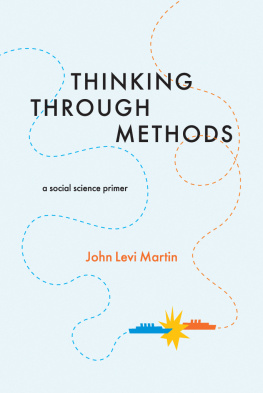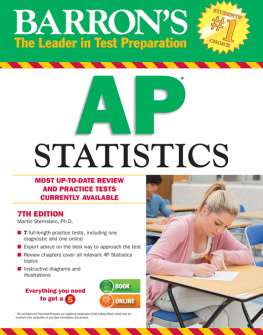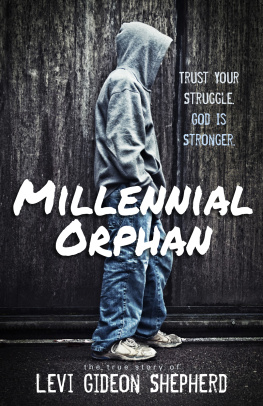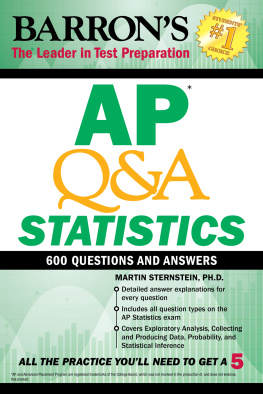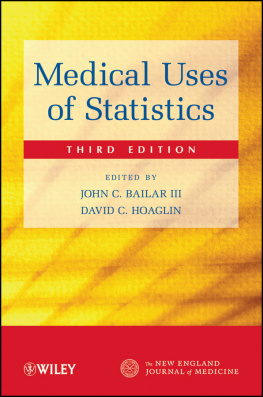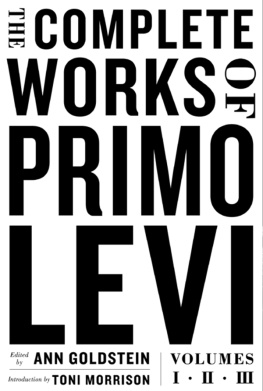Thinking Through Statistics
Thinking Through Statistics
John Levi Martin
The University of Chicago Press Chicago and London
The University of Chicago Press, Chicago 60637
The University of Chicago Press, Ltd., London
2018 by The University of Chicago
All rights reserved. No part of this book may be used or reproduced in any manner whatsoever without written permission, except in the case of brief quotations in critical articles and reviews. For more information, contact the University of Chicago Press, 1427 E. 60th St., Chicago, IL 60637.
Published 2018
Printed in the United States of America
27 26 25 24 23 22 21 20 19 18 1 2 3 4 5
ISBN-13: 978-0-226-56746-4 (cloth)
ISBN-13: 978-0-226-56763-1 (paper)
ISBN-13: 978-0-226-56777-8 (e-book)
DOI: https://doi.org/10.7208/chicago/9780226567778.001.0001
Library of Congress Cataloguing-in-Publication Data
Names: Martin, John Levi, 1964 author.
Title: Thinking through statistics / John Levi Martin.
Description: Chicago ; London : The University of Chicago Press, 2018. | Includes bibliographical references and index.
Identifiers: LCCN 2017053885 | ISBN 9780226567464 (cloth : alk. paper) | ISBN 9780226567631 (pbk. : alk. paper) | ISBN 9780226567778 (e-book)
Subjects: LCSH: StatisticsMethodology. | Social sciencesMethodology.
Classification: LCC HA29 .M135 2018 | DDC 001.4/22dc23
LC record available at https://lccn.loc.gov/2017053885

This paper meets the requirements of ANSI / NISO Z39.48-1992 (Permanence of Paper).
Contents
Why another book on statistics, and from a non-statistician?
The answer is becauseand I mean this in a good wayif you are a practicing sociologist, statisticians are not your friends.
Theyre nice enough people, and statistics is a wonderful field, but the problems that they solve are not your problems. And in fact, well see over the course of this book, that a lot of the time, the solutions they propose to their problems are going to make your problems worse.
Why? Simple. Statisticians have the job of determining the problems that come from the tasks of estimation and inference to a population, and solving them if possible. They can guarantee you the best answers, if you already know the right model.
But in sociology (and in most of its kin), we never already know the right modelwe never have full knowledge about what is going on out there in the world. Id love it if some day we did, and all we need to do was to pin down our numerical estimates. But we use statistical data analysis to try to tell us which model to believe in. That leads to different problems, and those are the problems Im going to deal with in this book.
Whom This Book Is For
You are a social scientista sociologist, a political scientist, a public health researcher, an applied economistand you want to learn from formal data analysis. Youve taken at least one statistics class, and you are comfortable with the idea of multiple regression. You can read an equation, but dont necessarily deal with matrices a lot. You might also be interested in these new cool things youve seen and heard about, like network analysis or spatial statistics. But you arent necessarily looking to quantify a causal effect of one variable on another such that you can predict an intervention. There are plenty of books to help you with that task. The problem is that most of our actual problems cant be squeezed into forms of that task, and trying doesnt help us learn anything.
If you are a good methodologist, there are going to be a number of times when I start patiently walking down a road, setting up a demonstration, and youre going to know where were going. Youre going to be impatient, and think, but thats obvious! Everyone knows that! But trust me, they dont. Even if you once taught it to your own students in class, theres a good chance that its no longer with them.
A Note on Sources
Im going to tell true stories here. That is, Im going to give examples of prominent work done by people in my field. And sometimes Im going to say that the work is wrong. Not wrong as in I would do it differently or wrong as in Thats not my perspective or wrong as in There are better classes of assumptions to make. I mean wrong. If Im wrong, Im going to look like an idiot. And chances are good Ill be wrong somewhere here. This sort of unreserved critiqueone of us messed upis not something that we feel good about in sociology.
I used to share that feeling. But my thinking changed as I saw good work being rejected by reviewers who didnt understand it, and good people being unemployed. I realized this sort of conflict aversion leads our discipline to reward hasty, bad work. This really hit home when I was teaching Bosks Forgive and Remember (discussed in Thinking Through Methods; hence, TTM). Every year, I grew increasingly outraged at the parts where the high-ranking doctors disclose that if they learned that a colleague was incompetent and harming patients, they would... do absolutely nothing. Why if I were they, I would think... and then, one year, it hit me. I was they. I knew of other sociologists who were publishing erroneous claims and I said nothing, because to do so seemed mean or uncool or hierarchical (if they were younger or less well placed).
That attitude, which I once had, confuses professional ethics with personal prudence. Let me be more blunt: it is more than prudence. Academics are among the most cowardly people with whom I have ever had to interact. If there is anyone who isnt a coward, she will be torn down by the others as being aggressive. Ugh.
We also have a disciplinary habit, I have found, of using the idea of complexity to ignore evidence. I really hope that we do continue to oppose the degradation of scientific debate to 255 character newspeak critweets (Martin book doubleplusungood!). But we can use our faith that things are complex to abrogate our responsibilities. Faced with a strong critique, its easy for us to decide to leave everything as it is, by thinking to ourselves, well, Im sure its more complicated than that. But sometimes the truth isnt a little bit here and a little bit there. You may need to think about some of this yourself. And you might need to take a stand.
At a certain point, theres a fork in the road. Either you believe in what you are doing, that the social sciences deserve support because theyre a real field of serious study, or theyre just a joke, or a form of entertainment, or a sinecure. If you go with the formerand I dothen it isnt okay to let your field give the seal of approval to things that are wrong. We all need to work together to understand that we arent trying to tear individuals down, were trying to build our field up. You arent a bad person for finding and publicizing errors in others work, and just because youve made an error doesnt mean you cant do many other great things, before and afterwards.
Of course, I completely understand that by doing this, Im really asking people to go over my work with a fine-toothed comb. Since Ive started this, Ive been good at saving intermediate data files and all my programs. If people find embarrassing and incompetent errors, then I suppose at least I can say that this supports my general point, if not my own careerour practice is one that allows for bad work to drive out good.


 This paper meets the requirements of ANSI / NISO Z39.48-1992 (Permanence of Paper).
This paper meets the requirements of ANSI / NISO Z39.48-1992 (Permanence of Paper).
